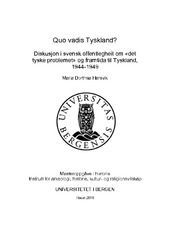| dc.description.abstract | This master thesis analyses discussions of “the German Problem” and the future of Germany in the Swedish public between 1944-1949. The research focuses on political, humanitarian and economical aspects of the debates about the reconstruction of Germany. The source material consists of the newspapers Arbetaren, Dagens Nyheter, Stockholms-Tidningen, Svenska Dagbladet, as well as other publications from the same period. This thesis argues that the Swedish public considered Sweden to be a democratic and humanitarian nation suited for participation in the spiritual and democratic reconstruction of Germany. Sweden had a special position as a neutral state during and after the Second World War. Because Sweden was spared war and occupation, it had the resources to contribute on a large scale to the rebuilding of Europe and became an important actor in this respect. Despite their declaration of neutrality, Sweden sold iron ore to Germany and gave them permission to transport troops through Sweden during the war. For this they received criticism both during and after the war. Therefore, they wanted to create goodwill among the international community in the post-war period by providing international aid. The Swedish public had a considerable interest in the future of Germany, especially the German-speaking exiles in Sweden, most of whom were Social Democrats with a particular interest in the political reconstruction of post-war Germany. Swedish humanitarian aid to Germany was considered to be an important contribution to the economic and political reconstruction of Europe. Both humanitarian and political solutions discussed in the Swedish public were strongly influenced by social democratic ideas. German federalism was seen as the best and most viable political solution to secure peace and to avoid a centralized and aggressive Germany. The discussions in the Swedish public of “The German Problem” and the future of Germany were interpreted in relation to the political and ideological dynamics of the Cold War. Also, the role of German history played an important role in the debates about the future of Germany. It reflected the attitudes toward the question of guilt and the rise of National Socialism. Any forms of “Vansittartism”, i.e. the portrayal of Germans with innate militaristic and anti-democratic characteristics, were rejected by the Swedish public. On the other hand, the expulsion of Germans from Central- and Eastern-Europe was viewed as necessary to avoid minority problems in Central European states, similarly to what occurred during the inter-war period. | en_US |
